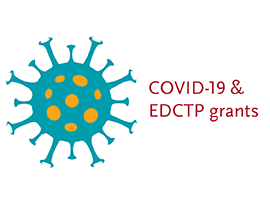On 7 April 2020. Communication on the Global EU response to COVID-19.
The EU coronavirus response plan relies on three aspects:
 The European and Developing Countries Clinical Trials Partnership (EDCTP) is launching emergency calls for expressions of interest to support research on the coronavirus and strengthen research capacities in sub-Saharan Africa.
The European and Developing Countries Clinical Trials Partnership (EDCTP) is launching emergency calls for expressions of interest to support research on the coronavirus and strengthen research capacities in sub-Saharan Africa.
Related:
Ursula von der Leyen, President of the European Commission, recorded a video message at the European Commission in Brussels, Belgium, on the global EU response to the coronavirus pandemic.
On this occasion, Ursula von der Leyen stressed the need for a coordinated global response and announced that the European Union is securing more than 15 billion euros to provide help worldwide in the fight against coronavirus. The President of the European Commission concluded her statement by saying that the EU stands ready to coordinate a strong international response to the pandemic.
The EU coronavirus response plan relies on three aspects:
- tackle Immediate needs (humanitarian and health response)
- strengthen the health, water and sanitation systems of partner countries, and support research
- address the economic and social consequences
The European Commission launched its global response to fight the pandemic, which development ministers from EU member states discussed during a video conference.
From the overall package of €15.6 billion
From the overall package of €15.6 billion
- €3.25 billion are channelled to Africa, including €2.06 billion for sub-Saharan Africa and €1.19 billion for the Northern African neighbourhood countries.
- €3.07 billion for the whole neighbourhood – €2.1 billion for the Southern Neighbourhood and €962 million for the Eastern Partner countries – and €800 million for the Western Balkans and Turkey.
- Most resources will be drawn from programmes that cannot be implemented as planned due to the pandemic.
Relevant links European Commission global response to fight the pandemic:
- Link to the communication
- Q and A
- Factsheet global response to coronavirus: supporting our partner countries
Examples of emergency EU support to partner countries:
- In Ethiopia, the EU has rapidly mobilised EUR 10 million to support the Government’s Preparedness and Response Plan to the coronavirus outbreak.
- In Nigeria, the EU will support the United Nations Development Programme (UNDP) with a EUR 50 million contribution to implement the UN Response Plan to COVID-19.
- In the Caribbean, the EU has put in place a regional support to the Caribbean Public Health Agency CARPHA
- In Venezuela, and the countries in the region, the EU is supporting the Pan-American Health Organisation and the International Federation of the Red Cross and Red Crescent
- In Sudan, the EU is working to ensure access to clean water and hygiene and raise awareness about the virus
- In Sierra Leone, EUR 34.7 million will be provided to address the economic consequences of COVID-19
Three calls in total will be funded with over EUR 25 million from Horizon 2020, the EU research and innovation programme.
Ursula von der Leyen, President of the European Commission, recorded a video message at the European Commission in Brussels, Belgium, on the global EU response to the coronavirus pandemic.
On this occasion, Ursula von der Leyen stressed the need for a coordinated global response and announced that the European Union is securing more than 15 billion euros to provide help worldwide in the fight against coronavirus. The President of the European Commission concluded her statement by saying that the EU stands ready to coordinate a strong international response to the pandemic.
- The EU recognizes that unless the virus is defeated everywhere, it is not defeated and that the global pandemic can only be solved globally with united global decisions and actions.
- The EU budget for the crisis is more than 20 billion Euro, with resources coming from:
- 15,6 from existing external action resources
- 1,55 billion in guarantees to Africa and the neighbourhood from the European Fund for Sustainable Development (EFSD)
- 5,2 billion in loans from the EU investment bank (loans will be accelerated)
- There is no fresh money; it will be simply reoriented
- Al countries will receive the same amount of funds already approved, no changes here, but the money will be redirected to the crisis.
- Vital programmes providing basic services such as health, food security, nutrition, water and sanitation and education can continue to function and will be broadened as much as possible to address the coronavirus specifically.
- Loans: there will be more flexibility and acceleration.
- Debt relief: the EU supports the joint appeal by the IMF and the World Bank (WB) on a debt moratorium for the poorest countries, with concessional loans from the International Development Association (IDA). It aims at easing the debt burden from bilateral official creditors.


No comments:
Post a Comment